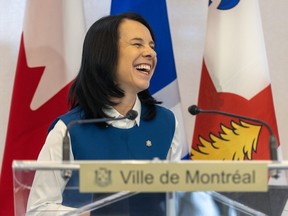The city’s first female mayor came to power leading a party with an ambitious agenda to make the city friendlier, greener, safer and more accessible. How did she do?

After two terms in office, Montreal Mayor Valérie Plante plans to call it quits after next year’s election.
Plante came to power leading a party with an ambitious agenda to make the city friendlier, greener, safer and more accessible. So how did the self-proclaimed mayor of mobility do? Here are a few of her greatest successes and failures.
Success: Bike paths

Say what you will about Plante, but her legacy will probably be seen for decades to come on Peel St., St-Denis St. and St-Antoine St. with the creation of the Réseau express vélo, a trademark of her Projet Montréal administration. Despite facing some opposition as they were implemented, the bicycle paths have undoubtedly improved safety by placing physical barriers between cars and bikes. Before the REV, the city’s preference to bike paths was to paint lines on streets, a measure that frustrates both motorists and cyclists, with cyclists saying only physical barriers will improve safety and encourage more people to ride on two wheels.
Success: Pedestrian streets

Success: Environment

Success/failure: Transit

Other transit achievements made during her tenure are the REM, the extension of the Blue Line and the SRB Pie-IX, but it was mostly the province and Plante’s predecessors who get credit for implementing those projects. Plante did make transit more accessible to seniors by providing free passes to anyone 65 and older across the island of Montreal, and permitting children 12 and under to ride free when accompanied.
Failure: Road safety and congestion

The shine certainly came off Plante in the last two summers, as car traffic returned to its pre-pandemic levels and drivers realized the extent to which the road network was in poor shape. Numerous detours downtown because of road construction and badly managed projects are not necessarily the fault of the municipal government, but Plante became the scapegoat for frustrated drivers. Her pro-bicycle leanings certainly didn’t help in this regard. Plante also promised to improve road safety by implementing a vision zero strategy in hopes of eliminating pedestrian deaths. But road safety continues to be a major issue, with little improvement in the number of pedestrians being hit on the street.
Failure: Housing/homelessness

Plante’s plan to encourage private developers to build social and affordable housing has yet to bear substantial fruit. She introduced the so-called 20-20-20 bylaw, requiring new developments to be comprised of 20 per cent social housing, 20 per cent affordable housing and 20 per cent family housing, which means units of three bedrooms or more. However, with few actual units in the pipeline and none yet fully built, the city adjusted that bylaw earlier this year.
Failure: City finances
